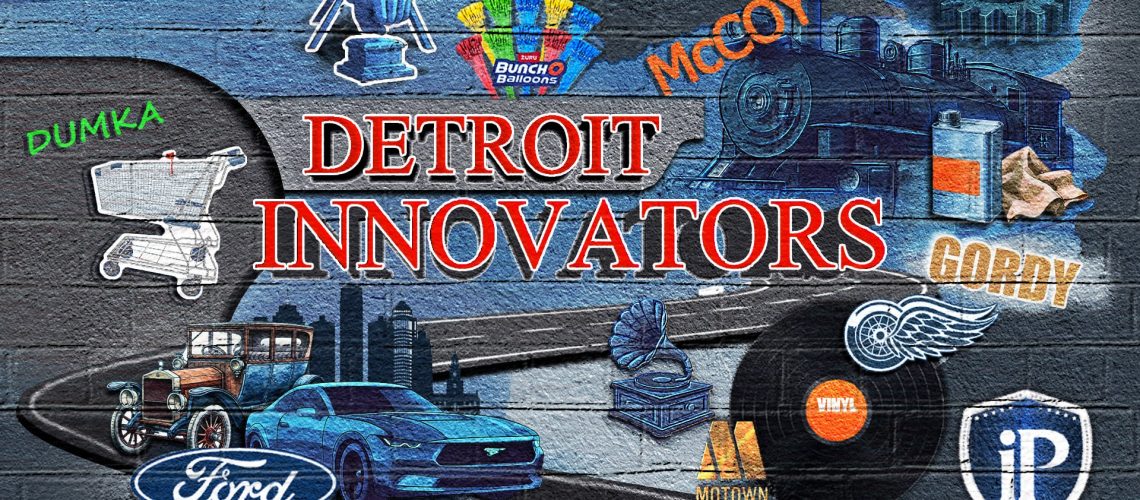Detroit’s Legacy of Innovation: From Henry Ford to Today’s Inventors
Detroit’s Legacy of Innovation is known worldwide as the Motor City, but its story runs deeper than automobiles. It is a city built on ingenuity, grit, and bold ideas that reshaped industries and inspired generations. From the assembly line that put the world on wheels to the inventions that kept trains running and the music that moved hearts across the globe. Detroit has long been a hub of innovation. And that tradition continues today, as inventors in the city and its surrounding areas prove that creativity and persistence are as alive as ever.
In this blog, we highlight some of Detroit’s most impactful innovators — Henry Ford, Elijah McCoy, Berry Gordy, Josh Malone, and Jean Dumka — and explore what their stories can teach today’s inventors.
Henry Ford: The Visionary Who Put the World on Wheels
When people think of Detroit’s Legacy of Innovation, the first name that comes to mind is Henry Ford. He did not invent the automobile, but he changed the world by making cars affordable for everyday people.
Ford’s greatest contribution was the moving assembly line, introduced in 1913. This single innovation cut production time for a Model T from 12 hours to just 90 minutes. Suddenly, cars weren’t just a luxury for the wealthy — they became accessible to working families. By 1927, more than 15 million Model Ts had been produced, and the world would never be the same.
Ford’s vision extended beyond automobiles. He pioneered labor reforms by paying workers $5 a day in 1914, a wage that was considered shockingly high at the time. That decision reduced turnover, created loyalty, and helped build the American middle class. Ford also shortened the workweek and popularized the concept of the weekend, showing that innovation isn’t only about machines but also about how we live and work.
And his curiosity didn’t stop there. Ford was behind the creation of Kingsford charcoal briquets, a product born from repurposing wood scraps from car production. He invested in aviation and experimented with farming innovations.
Ford embodied the Detroit spirit: never satisfied, always moving forward. As he put it, “Failure is simply the opportunity to begin again, this time more intelligently.”
Elijah McCoy: The Real McCoy of Engineering
Before there were cars, trains powered the nation. And trains kept running smoothly thanks to the ingenuity of Elijah McCoy, one of Detroit’s most celebrated inventors.
Born in 1844 to parents who had escaped slavery in Canada, McCoy studied mechanical engineering in Scotland before returning to North America. Working as a fireman and oilman for the Michigan Central Railroad, he noticed a serious problem: locomotives had to stop frequently for manual lubrication. That wasted time, money, and efficiency.
McCoy’s solution was a self-lubricating cup that automatically oiled moving parts while trains were running. His invention revolutionized rail travel, making it safer and more efficient. Over his lifetime, McCoy was awarded more than 50 patents, and his name became synonymous with authenticity. Buyers would ask if a product was “the real McCoy,” a phrase still used today.
McCoy’s story is especially powerful because he succeeded at a time when opportunities for Black inventors were rare. He broke barriers not with speeches but with solutions, leaving a legacy that Detroit and the world still benefit from.
Berry Gordy: Reinventing the Sound of America
Innovation isn’t always about machinery. Sometimes it’s about culture, and few people shaped American culture like Berry Gordy.
In 1959, Gordy founded Motown Records in Detroit, a company that would forever change the music industry. Gordy applied an assembly-line approach — inspired by the city’s auto factories — to artist development. Singers were trained, polished, and paired with expert songwriters and producers. The result was a sound that was consistent, polished, and irresistible.
Motown became a cultural force, launching the careers of legends like Diana Ross, Stevie Wonder, Marvin Gaye, and the Jackson 5. It bridged racial divides during a turbulent era, bringing Black artists into mainstream American homes and shaping popular music for generations.
While Gordy wasn’t inventing machines, his innovation was just as groundbreaking. He turned Detroit into the heartbeat of American music, proving that innovation can take many forms — and that leadership and vision matter as much as creativity itself.
Josh Malone: Fighting for His Invention
Fast forward to modern times, and Detroit’s Legacy of Innovation is still alive. One example is Josh Malone, the inventor of Bunch O Balloons.
While living in the Detroit area, Malone came up with a way to fill and tie dozens of water balloons in under a minute. His invention turned summer fun into a booming business and solved a problem parents everywhere understood: the frustration of hand-tying balloon after balloon.
Malone’s story also highlights the darker side of being an inventor. After launching Bunch O Balloons, he faced copycats that tried to steal his idea. What followed was a long and expensive legal battle to defend his patent. Eventually, Malone prevailed, winning a $31 million judgement that affirmed his rights and set precedents for other inventors.
His fight is an important reminder: inventing isn’t just about having a great idea. It’s about protecting it, fighting for it, and refusing to back down when others try to take shortcuts.
Jean Dumka: From Frustration to Licensing Deal
Detroit’s tradition of innovation isn’t just history — it’s happening now. Jean Dumka, a modern inventor from the area, turned an everyday frustration into a licensed product with nationwide potential.
Her invention, the FlipFix, solves a problem everyone has faced: broken shopping carts. Whether it’s a wobbly wheel, a loud squeak, or a cart pulling to one side, bad carts make shopping miserable. Jean’s solution was simple but powerful: a flip-up flag attached to the cart. Customers flip the flag to signal the cart is broken, and store staff know instantly it needs repair.
The FlipFix doesn’t just reduce frustration. It saves retailers money by cutting down on cart replacements, prevents damage to shelves and products, and reduces the risk of injuries — especially to children. It even creates new advertising opportunities, since the flags can carry printed messages.
Jean worked on her own for years, unsure of how to move forward. Like many inventors, she received bad advice and felt stuck. Everything changed when she connected with our team at Inventor Process. With a clear plan and expert guidance, her idea gained traction. Companies started responding, and before long, she secured a licensing deal.
As Jean herself put it, “I had no idea what to do before Inventor Process. Once I had a plan, everything became clear.” Her success is proof that even simple ideas can have a massive impact — and that persistence paired with the right support can turn frustration into opportunity.
Lessons for Today’s Inventors
These stories span centuries and industries, but they share common themes. Henry Ford showed how efficiency and vision can transform an industry. Elijah McCoy demonstrated that practical solutions can have lasting impact. Berry Gordy proved that innovation applies to culture as much as machines. Josh Malone highlighted the importance of protecting intellectual property. And Jean Dumka reminded us that persistence plus the right plan can lead to success.
For inventors today, these lessons are clear:
- Solve a real problem. The best ideas address frustrations people already feel.
- Think beyond the idea. Execution, efficiency, and protection matter as much as the invention itself.
- Seek guidance. Even great inventors need strategies, plans, and support systems.
- Stay persistent. Every innovator faces obstacles, but resilience is what separates ideas that fade from those that succeed.
Detroit’s legacy proves that innovation is not reserved for a chosen few. It belongs to anyone willing to dream, create, and push forward.
Conclusion: Carrying Detroit’s Spirit Forward
From Ford’s assembly line to Dumka’s FlipFix, Detroit has always been a city where frustration turns into ingenuity and ideas become reality. The names and industries may change, but the spirit remains the same.
At Inventor Process, we’re proud to work with inventors like Jean who carry that legacy forward. Their stories prove that the next great innovation could come from anyone — even from a simple spark of frustration in a grocery store aisle.
👉 Learn more about Inventor Process: https://www.inventorprocess.com





